While COVID-19 Shuts Down Life, WCA Presses on with Remote Learning Plan
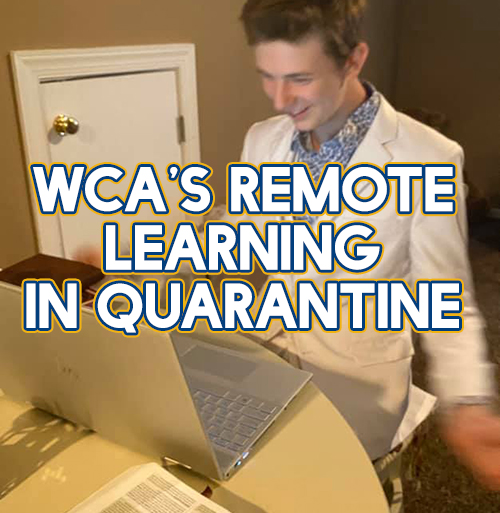
- April 17, 2020
- 2019-2020, Academics, Arts, Athletics, College Admissions & Scholarships, Community Service, High Profile Posts for Feed, Lower School News, Middle School News, Spiritual Life, Student Life, Summer Programs, Uncategorized, Upper School News
- coronavirus, COVID-19, curriculum, Google Classroom, Google for Educfation, Google Meet, GSuite, johnny graham, preschool, remote course system, remote learning
In late February, the news of a flu-like virus started making waves in the International news media as an epidemic that would almost certainly find its way to the United States. Williamsburg Christian Academy Head of School Johnny Graham sent a preparatory email at that time, spelling out plans in the 'unlikely' event of a scenario requiring students to be sent home due to a pandemic spread of the novel virus. WCA would take several steps, including potentially postponing commencement, instituting remote work arrangements for staff, and, most importantly, ensuring continuity in the academic school year for students through the implementation of WCA's remote course learning system.
Not Ideal, But Still on Track
"Although we feel one of the greatest value propositions our school offers is our direct teacher to student interaction and personalization of their education, all things considered, we have weathered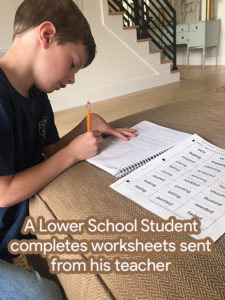
Lower School Spread of Needs Proves Challenging in Remote Application
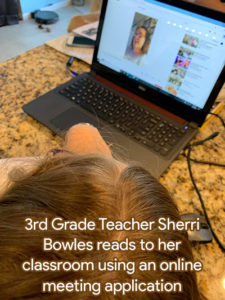 The greatest challenge, for sure, has been the Lower School grades at WCA; that is, from Preschool through 5th grade. Much of how teachers educate in those grades is very hands-on and very relational. Additionally, the approach to teaching a kindergarten student differs vastly from the approach used for a fifth-grader. As a result, there was no way to develop the remote classroom environment with one broad brush stroke. When the potential for the need for remote study rapidly approached reality, teachers on each level had to develop a system of conveying the same classroom information in a home setting. Though the absence of direct supervision from teachers has required more parental supervision of work completed, the lower school teachers have each developed highly effective teaching approaches and work
The greatest challenge, for sure, has been the Lower School grades at WCA; that is, from Preschool through 5th grade. Much of how teachers educate in those grades is very hands-on and very relational. Additionally, the approach to teaching a kindergarten student differs vastly from the approach used for a fifth-grader. As a result, there was no way to develop the remote classroom environment with one broad brush stroke. When the potential for the need for remote study rapidly approached reality, teachers on each level had to develop a system of conveying the same classroom information in a home setting. Though the absence of direct supervision from teachers has required more parental supervision of work completed, the lower school teachers have each developed highly effective teaching approaches and work  assignments that have kept our Lower School students engaged and on track. "Just like in the classroom, differentiation is key," explains kindergarten teacher Staci Lanier. "It's been so refreshing to see students completing the same activity in many different ways." To try and maintain that critical personal connection, teachers quickly ramped up and mastered either Zoom or Google Meet to get the critical facetime that is an afterthought in day to day class. They've also posted personal messages with focused learning objectives for the day via Instagram and with other online tools. "Zoom Meetings and individual chats have been a great way to stay connected with my students and parents,"
assignments that have kept our Lower School students engaged and on track. "Just like in the classroom, differentiation is key," explains kindergarten teacher Staci Lanier. "It's been so refreshing to see students completing the same activity in many different ways." To try and maintain that critical personal connection, teachers quickly ramped up and mastered either Zoom or Google Meet to get the critical facetime that is an afterthought in day to day class. They've also posted personal messages with focused learning objectives for the day via Instagram and with other online tools. "Zoom Meetings and individual chats have been a great way to stay connected with my students and parents," 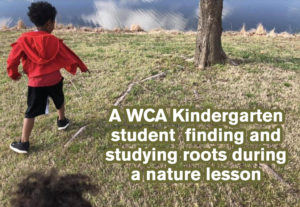 offered Lanier. "The biggest lesson I've learned has been listening to what the parents need from me as a teacher and then giving them options and flexibility in what is assigned and how it can be completed."
offered Lanier. "The biggest lesson I've learned has been listening to what the parents need from me as a teacher and then giving them options and flexibility in what is assigned and how it can be completed."
Spiritual Life Stays in Focus
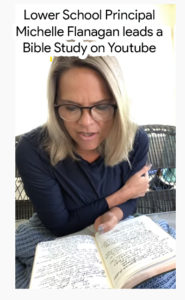 And of course, the remote element of the Lower School is not limited to merely academics. Lower School Principal Michelle Flanagan started a Bible study for parents almost immediately following the shift to remote study. Her 'Journey Through John' videos are posted on the school's Youtube channel and allow families to stay connected to God during a time where it has never been more critical to do so. Another spiritual life element that has gone virtual at WCA is Praise and Worship, an assembly of the entire lower school to start each day singing songs and setting a spiritual tone for the day. Music teacher Chelsea Mesisinger set up a playlist on Spotify of most of the songs sung at praise and worship so that Lower School students could start the day with a note of familiarity.
And of course, the remote element of the Lower School is not limited to merely academics. Lower School Principal Michelle Flanagan started a Bible study for parents almost immediately following the shift to remote study. Her 'Journey Through John' videos are posted on the school's Youtube channel and allow families to stay connected to God during a time where it has never been more critical to do so. Another spiritual life element that has gone virtual at WCA is Praise and Worship, an assembly of the entire lower school to start each day singing songs and setting a spiritual tone for the day. Music teacher Chelsea Mesisinger set up a playlist on Spotify of most of the songs sung at praise and worship so that Lower School students could start the day with a note of familiarity.
Upper School Remote Study Has Students Working Hard
The Upper School transition has presented specific challenges as well. But many teachers were already using many of the tools necessary to teach remotely, such as Google Classroom, Google Meet, and other components of the Google for Education Suite, such as Google Docs, Google Slides, and Youtube. The school is currently working on training teachers to use Jamboard, Google's collaborative digital whiteboard available through tablet and mobile apps, as well as on the web. Ironically, a significant initiative before the start of the 2020-2021 school year was a planned shift for all teachers to fully utilize Google Classroom for the maintenance and communication of assigned homework 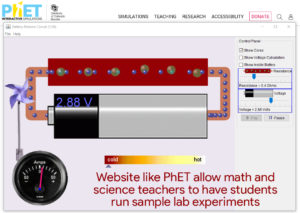
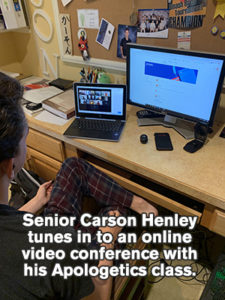
As mentioned, WCA deployed the Remote Course Study program on March 16th, the first day home from classes after the mandated school closures. As a result, WCA students stayed on course for their curriculum objectives until the school broke class for its previously scheduled Spring Break from April 4th -13th. Students in the Upper School would almost universally attest that those first two weeks were rigorous, to say the least. "I didn't mind it, but I was kept very busy with multiple tasks for a variety of different courses," commented freshman Jacob Thibeault on the workload the first week into the remote course study. "Fortunately, (Head of School) Mr. Johnny Graham implemented a revised schedule, reducing the daily workload, and working out a few kinks in the new system." WCA students have accomplished this all while many students in the area are just now starting to attempt to resume classes, and are unsure whether teachers will even grade any of the work completed. Thibeault expanded on the fact that while remote learning has its benefits, there truly is no substitute for live teaching and being around his peers. "I do find it difficult to grasp certain topics without having it taught in a classroom setting," Thibeault added. "I do enjoy my online class meetings, which allows me to interact with my classmates like we usually would in the classroom. All things considered, and with the revised schedule in place, I am a fan of RCS (Remote Course Study), but I am also hoping to see my classmates again and spend time with them when all this crazy business settles down."
Another Silver Lining- Student Ownership in the Truest College Prep Style
Preschool Reopened as an Essential Business
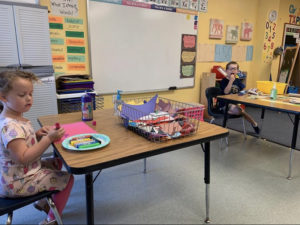 Within ten days of schools closing, the quarantine unveiled a significant problem: Parents working jobs in essential services would not be able to care for their very young children with many preschools and day-care facilities closed nationwide. There was some easing on this front, and WCA (as social services approved day-care facility) was permitted to reopen their Preschool on a limited basis. Several students returned to WCA for those parents unable to shelter them at home due to their work requirements.
Within ten days of schools closing, the quarantine unveiled a significant problem: Parents working jobs in essential services would not be able to care for their very young children with many preschools and day-care facilities closed nationwide. There was some easing on this front, and WCA (as social services approved day-care facility) was permitted to reopen their Preschool on a limited basis. Several students returned to WCA for those parents unable to shelter them at home due to their work requirements.
Staff Also Working Remote
Looking Ahead
As schools have been ordered closed for the remainder of the school year, WCA will complete all courses using the Remote Course Study program, including final exams. At this point, projections would seem to indicate that Commencement will not be able to occur as scheduled on June 6th as originally scheduled. The school has tentatively planned an alternate date of July 18th, which it prays will be a possibility. There is also forward planning around the return in the fall, given the uncertainty surrounding the timeline for normalcy in our daily routines. Using the best available COVID-19 reopening health information from national medical experts, Mr. Graham will articulate Williamsburg Christian Academy's phased-in operational plan for the 2020-21 school year in the coming weeks.
And the big picture future of WCA? "We hope that the Williamsburg community sees how ready we were for this, how effectively we have been able to keep our students on course with amazing academics and how we are developing life skills and character in our students," commented Head of School Graham. "And I hope they decide they want that for their kids, too. The world is going to need Eagles going forward now more than it ever has before."
While COVID-19 Shuts Down Life, WCA Presses on with Remote Learning Plan

- April 17, 2020
- 2019-2020, Academics, Arts, Athletics, College Admissions & Scholarships, Community Service, High Profile Posts for Feed, Lower School News, Middle School News, Spiritual Life, Student Life, Summer Programs, Uncategorized, Upper School News
- coronavirus, COVID-19, curriculum, Google Classroom, Google for Educfation, Google Meet, GSuite, johnny graham, preschool, remote course system, remote learning
In late February, the news of a flu-like virus started making waves in the International news media as an epidemic that would almost certainly find its way to the United States. Williamsburg Christian Academy Head of School Johnny Graham sent a preparatory email at that time, spelling out plans in the 'unlikely' event of a scenario requiring students to be sent home due to a pandemic spread of the novel virus. WCA would take several steps, including potentially postponing commencement, instituting remote work arrangements for staff, and, most importantly, ensuring continuity in the academic school year for students through the implementation of WCA's remote course learning system.
Not Ideal, But Still on Track
"Although we feel one of the greatest value propositions our school offers is our direct teacher to student interaction and personalization of their education, all things considered, we have weathered
Lower School Spread of Needs Proves Challenging in Remote Application
 The greatest challenge, for sure, has been the Lower School grades at WCA; that is, from Preschool through 5th grade. Much of how teachers educate in those grades is very hands-on and very relational. Additionally, the approach to teaching a kindergarten student differs vastly from the approach used for a fifth-grader. As a result, there was no way to develop the remote classroom environment with one broad brush stroke. When the potential for the need for remote study rapidly approached reality, teachers on each level had to develop a system of conveying the same classroom information in a home setting. Though the absence of direct supervision from teachers has required more parental supervision of work completed, the lower school teachers have each developed highly effective teaching approaches and work
The greatest challenge, for sure, has been the Lower School grades at WCA; that is, from Preschool through 5th grade. Much of how teachers educate in those grades is very hands-on and very relational. Additionally, the approach to teaching a kindergarten student differs vastly from the approach used for a fifth-grader. As a result, there was no way to develop the remote classroom environment with one broad brush stroke. When the potential for the need for remote study rapidly approached reality, teachers on each level had to develop a system of conveying the same classroom information in a home setting. Though the absence of direct supervision from teachers has required more parental supervision of work completed, the lower school teachers have each developed highly effective teaching approaches and work  assignments that have kept our Lower School students engaged and on track. "Just like in the classroom, differentiation is key," explains kindergarten teacher Staci Lanier. "It's been so refreshing to see students completing the same activity in many different ways." To try and maintain that critical personal connection, teachers quickly ramped up and mastered either Zoom or Google Meet to get the critical facetime that is an afterthought in day to day class. They've also posted personal messages with focused learning objectives for the day via Instagram and with other online tools. "Zoom Meetings and individual chats have been a great way to stay connected with my students and parents,"
assignments that have kept our Lower School students engaged and on track. "Just like in the classroom, differentiation is key," explains kindergarten teacher Staci Lanier. "It's been so refreshing to see students completing the same activity in many different ways." To try and maintain that critical personal connection, teachers quickly ramped up and mastered either Zoom or Google Meet to get the critical facetime that is an afterthought in day to day class. They've also posted personal messages with focused learning objectives for the day via Instagram and with other online tools. "Zoom Meetings and individual chats have been a great way to stay connected with my students and parents,"  offered Lanier. "The biggest lesson I've learned has been listening to what the parents need from me as a teacher and then giving them options and flexibility in what is assigned and how it can be completed."
offered Lanier. "The biggest lesson I've learned has been listening to what the parents need from me as a teacher and then giving them options and flexibility in what is assigned and how it can be completed."
Spiritual Life Stays in Focus
 And of course, the remote element of the Lower School is not limited to merely academics. Lower School Principal Michelle Flanagan started a Bible study for parents almost immediately following the shift to remote study. Her 'Journey Through John' videos are posted on the school's Youtube channel and allow families to stay connected to God during a time where it has never been more critical to do so. Another spiritual life element that has gone virtual at WCA is Praise and Worship, an assembly of the entire lower school to start each day singing songs and setting a spiritual tone for the day. Music teacher Chelsea Mesisinger set up a playlist on Spotify of most of the songs sung at praise and worship so that Lower School students could start the day with a note of familiarity.
And of course, the remote element of the Lower School is not limited to merely academics. Lower School Principal Michelle Flanagan started a Bible study for parents almost immediately following the shift to remote study. Her 'Journey Through John' videos are posted on the school's Youtube channel and allow families to stay connected to God during a time where it has never been more critical to do so. Another spiritual life element that has gone virtual at WCA is Praise and Worship, an assembly of the entire lower school to start each day singing songs and setting a spiritual tone for the day. Music teacher Chelsea Mesisinger set up a playlist on Spotify of most of the songs sung at praise and worship so that Lower School students could start the day with a note of familiarity.
Upper School Remote Study Has Students Working Hard
The Upper School transition has presented specific challenges as well. But many teachers were already using many of the tools necessary to teach remotely, such as Google Classroom, Google Meet, and other components of the Google for Education Suite, such as Google Docs, Google Slides, and Youtube. The school is currently working on training teachers to use Jamboard, Google's collaborative digital whiteboard available through tablet and mobile apps, as well as on the web. Ironically, a significant initiative before the start of the 2020-2021 school year was a planned shift for all teachers to fully utilize Google Classroom for the maintenance and communication of assigned homework 

As mentioned, WCA deployed the Remote Course Study program on March 16th, the first day home from classes after the mandated school closures. As a result, WCA students stayed on course for their curriculum objectives until the school broke class for its previously scheduled Spring Break from April 4th -13th. Students in the Upper School would almost universally attest that those first two weeks were rigorous, to say the least. "I didn't mind it, but I was kept very busy with multiple tasks for a variety of different courses," commented freshman Jacob Thibeault on the workload the first week into the remote course study. "Fortunately, (Head of School) Mr. Johnny Graham implemented a revised schedule, reducing the daily workload, and working out a few kinks in the new system." WCA students have accomplished this all while many students in the area are just now starting to attempt to resume classes, and are unsure whether teachers will even grade any of the work completed. Thibeault expanded on the fact that while remote learning has its benefits, there truly is no substitute for live teaching and being around his peers. "I do find it difficult to grasp certain topics without having it taught in a classroom setting," Thibeault added. "I do enjoy my online class meetings, which allows me to interact with my classmates like we usually would in the classroom. All things considered, and with the revised schedule in place, I am a fan of RCS (Remote Course Study), but I am also hoping to see my classmates again and spend time with them when all this crazy business settles down."
Another Silver Lining- Student Ownership in the Truest College Prep Style
Preschool Reopened as an Essential Business
 Within ten days of schools closing, the quarantine unveiled a significant problem: Parents working jobs in essential services would not be able to care for their very young children with many preschools and day-care facilities closed nationwide. There was some easing on this front, and WCA (as social services approved day-care facility) was permitted to reopen their Preschool on a limited basis. Several students returned to WCA for those parents unable to shelter them at home due to their work requirements.
Within ten days of schools closing, the quarantine unveiled a significant problem: Parents working jobs in essential services would not be able to care for their very young children with many preschools and day-care facilities closed nationwide. There was some easing on this front, and WCA (as social services approved day-care facility) was permitted to reopen their Preschool on a limited basis. Several students returned to WCA for those parents unable to shelter them at home due to their work requirements.
Staff Also Working Remote
Looking Ahead
As schools have been ordered closed for the remainder of the school year, WCA will complete all courses using the Remote Course Study program, including final exams. At this point, projections would seem to indicate that Commencement will not be able to occur as scheduled on June 6th as originally scheduled. The school has tentatively planned an alternate date of July 18th, which it prays will be a possibility. There is also forward planning around the return in the fall, given the uncertainty surrounding the timeline for normalcy in our daily routines. Using the best available COVID-19 reopening health information from national medical experts, Mr. Graham will articulate Williamsburg Christian Academy's phased-in operational plan for the 2020-21 school year in the coming weeks.
And the big picture future of WCA? "We hope that the Williamsburg community sees how ready we were for this, how effectively we have been able to keep our students on course with amazing academics and how we are developing life skills and character in our students," commented Head of School Graham. "And I hope they decide they want that for their kids, too. The world is going to need Eagles going forward now more than it ever has before."



